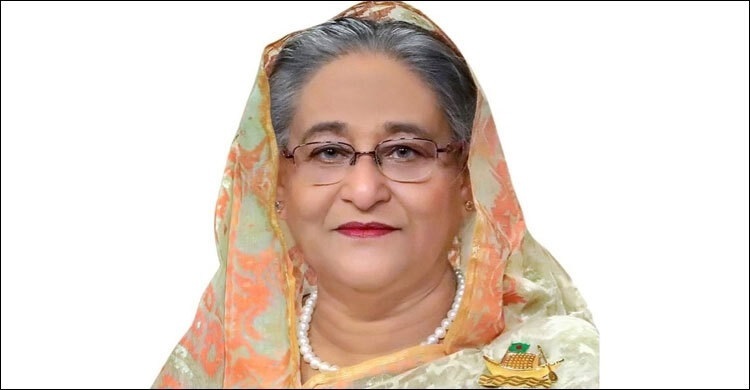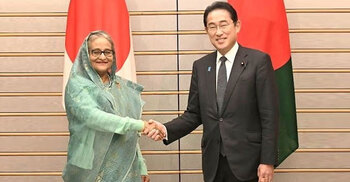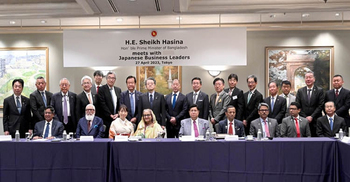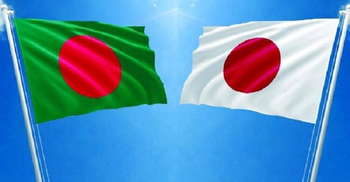Japan is a time-tested friend of Bangladesh: PM

Prime Minister Sheikh Hasina has described Japan as a time-tested friend of Bangladesh, saying the country has very close to her heart being few countries who early recognized Bangladesh within two months of achieving its independence.
"Japan is our trusted development partner. Bangladesh has received steadfast support for its development and has remained the recipient of the largest amount of official development assistance from Japan since our independence," she said.
The Prime Minister said this in an article headlined "Japan holds special place in our hearts" written by Sheikh Hasina was published in the country's largest and oldest English daily newspaper The Japan Times on April 25, on the second day of her four-day official visit to Tokyo.
She wrote, "I'm again in Tokyo to embolden the existing bilateral ties between my country, Bangladesh, and Japan as our countries celebrate the 51st anniversary of the establishment of diplomatic relations."
"I express my gratitude to The Majesties Emperor Naruhito and Empress Masako and my thanks to Prime Minister Fumio Kishida for the invitation. I also pay homage to former Prime Minister Shinzo Abe, who was a great friend of Bangladesh," she said.
The Premier said Japan was among those few countries that gave early recognition to Bangladesh on Feb. 10, 1972, less than two months after it achieved independence.
Even during our liberation war in 1971, she writes that Japan provided much needed support and assistance, which we have never forgotten nor shall ever forget, she said, adding that most unforgettable was the charitable gesture of Japanese schoolchildren who saved and donated their tiffin (snack) money to help victims of the cyclone and the war that ravaged our country.
"Since then, Japan has remained our time-tested friend. Japan is a country very close to my heart, just as it is to my family and our people," she said.
"My sister Sheikh Rehana is especially attached to Japan as she accompanied our father, the Father of the Nation Bangabandhu Sheikh Mujibur Rahman, and our youngest brother, Sheikh Russel, on their first visit to Japan in October 1973," she said.
She said alongside cherishing her father's legacy of having a soft spot for Japan, she has great respect for its miraculous development.
"Therefore, time and again, I come to Japan to learn from its invaluable experiences. These encourage me to apply and devote myself in body and spirit to building Bangladesh in the image of this great country. And, as I now feel that our two countries' relations have been cemented to an enviable level, I believe it is time to move on from our comprehensive partnership to a strategic partnership," she said.
The Premier said her father was captivated by the country's development and wanted to follow Japan as a model.
"He was also inspired by the design of the Japanese flag. Both flags are rectangular with red circles at the center against backgrounds of bottle green for Bangladesh and white for Japan," she said.
Sheikh Hasina continued: "On their return, they spoke frequently of their memorable experiences of Japan. Those remain in our memory, haunting us even more so now as tragically, all our family members other than Rehana and myself, were brutally assassinated just 22 months after that historic visit."
About Japanese investment, the Premier said it has been growing consistently in Bangladesh. In the recent ODA loan package, Japan has provided $2.67 billion in soft loans to Bangladesh, more than any other country.
"Our two-way bilateral trade surpassed $4 billion for the first time in the 2021-2022 fiscal year," she said.
Additionally, she said that Japan is implementing some of the major infrastructure projects of Bangladesh, including the mass rapid transit train line in Dhaka, the deep-sea port at Matarbari, the third terminal at Dhaka Airport and a special economic zone in Araihazar.
While assisting in our development efforts, some Japanese technical experts working on the MRT line were tragically killed by terrorists in Dhaka in July, 2016, Sheikh Hasina said.
"This remains one of the darkest episodes in Bangladesh's history. I recall their sacrifice with much sorrow, and once again extend my deepest condolences to their families. In spite of this tragic occurrence, our Japanese friends did not withdraw from the project, but instead diligently carried on with their work. With Japanese financial and technical assistance, the Dhaka MRT Line-6, first of its kind in the country, was inaugurated in December," she wrote in the article.
Despite challenges, she said Bangladesh has come a long way in attaining socioeconomic progress over the last 14 years of my tenure.
"Our country is no longer poverty-stricken. Rather, it is now considered a development miracle in which per capita income has grown more than five times in a decade and a half. Indeed, Bangladesh has made remarkable progress in human development, food security, women's empowerment, poverty reduction and infrastructure development," she said.
In fact, before the COVID-19 pandemic, Bangladesh's economy was growing at an average of over 6.5% for about a decade and 8.15% from 2018 to 2019, she said, adding that although the pandemic severely affected Bangladesh's economy, the country faced the impact by striking a balance between people's lives and livelihoods.
"Sadly, just as we were recovering from the pandemic, the Russia-Ukraine war and subsequent sanctions and counter sanctions struck a blow to our development gains. It has also led to abnormal price hikes for fuel, food and other commodities, as well as supply chain disruptions that have thrust countries like ours into dire straits," she said.
Moreover, she said the adverse impacts of climate change have also been troubling us in reaching our desired goals.
Late last year, nearly a third of Bangladesh was hit by cyclone Sitrang that claimed many lives while damaging crops, homes and fish farms, she wrote.
"In May and June, 2022, a devastating flood inundated Bangladesh's northern and northeastern regions, causing many casualties. Our resilient people have adapted to live with such calamities," she said.
Despite all hazards, Bangladesh's economy has been resilient and remained an attractive destination for foreign direct investment because of Bangladesh's liberal policies and laws, which are favorable and encouraging to investment, she said.
These include fiscal policies related to FDI, tax benefits, incentives for exports and a young, competitive labour force, she said, adding that an attractive initiative that is becoming popular among investors, both domestic and especially foreign, has been the establishing of 100 special economic zones.
Interestingly, Bangladesh has been fortunate in having a very strategic geographical location. It connects the Indian subcontinent to the west with Southeast Asia to the east. With its own domestic market of nearly 170 million people, Bangladesh sits on a consumer base of 3 billion.
"It is, therefore, growing gradually into the business and economic hub of the South Asian region. Bangladesh would be too happy to see more Japanese invest in Bangladesh for the mutual benefit of both our countries," she said.
About the Rohingya issue, she said, in the past six years, Bangladesh has, however, been facing the dilemma of taking care of about 1.1 million forcibly displaced Myanmar nationals.
"In the face of a genocidal pogrom, these people known as the Rohingya were allowed to take refuge on humanitarian grounds in Bangladesh. Their overdue presence has seriously been affecting the lives and livelihoods of the local communities. Now they are becoming a security threat to Bangladesh and to the entire region. Japan, with its benign influence in the region, could mediate and help return these Rohingyas back to their homes in Myanmar," she said.
She went on saying Bangladesh and Japan are both peace- loving nations collaborating in international forums to promote global peace, stability, sustainable development, progress and prosperity.
"I firmly believe that our cooperation and friendship shall continue to grow and prosper forever and ever," she said.
Source: BSS







